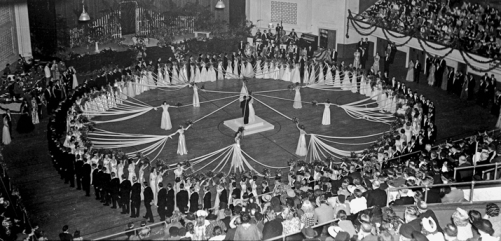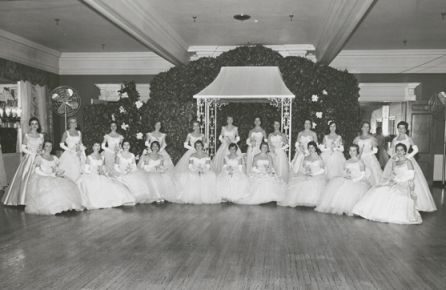
Debutante balls, or cotillions-social events in which parents formally present their teenage daughters to adult society-have been a feature of U.S. culture since the late nineteenth century. These balls, some of them all-white affairs, continue to be held in small numbers in North Carolina and other states. They remain controversial because of their unconcealed exclusivity, which is often based on economic and racial distinctions. The private, closed nature of some of the clubs that sponsor debutante balls has raised concern among those who view them as anachronistic and disturbing remnants of a racially segregated past. Supporters of debutante balls, however, argue that the events are important cultural institutions rooted in honorable traditions of personal and family pride, women's stature, and social responsibility, as well as a constitutional right to form private organizations.

The oldest and perhaps most influential ball still held in the state is the North Carolina Debutante Ball, sponsored annually by the Terpsichorean Club of Raleigh. Long considered the premier social event in the state, it originated in 1923 as the "Raleigh Fall Festival," sponsored by the merchants of the city. Prominent young white ladies from throughout the state were presented as candidates for Queen of the Festival before a queen was crowned by the governor. In 1927 the Terpsichorean Club was formed and held the first North Carolina Debutante Ball. The purpose of the club, which derived its name from the Greek mythological muse, Terpsichore, the goddess of dancing and choral song, was to "sponsor annually a ball for the presentation of North Carolina Debutantes to be held in Raleigh on the first weekend after Labor Day."
As the debutantes' activities grew from a one-night ball to a weekend of parties, teas, luncheons, and a second big dance, the ritual of having the debutantes formally presented was established. Each participant originally chose one chief marshal and four assistants. In 1956 the number of assistant marshals was reduced to two, and in 1963 the selection of fathers as chief marshals was encouraged, a change that greatly enhanced the dignity and significance of the occasion for the debutantes and their families.
The North Carolina Debutante Ball has been held every year since 1923, except during World War II. Because of the polio epidemic in 1948 it was postponed until a few days after Christmas, and it was postponed for the same period in 1996 because of the damage wrought across the state by Hurricane Fran.